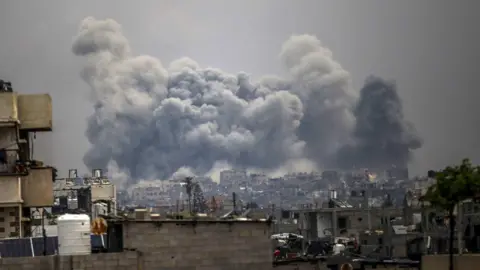The ongoing conflict in Gaza has intensified dramatically as Israel has launched a significant military operation aimed at defeating Hamas and ensuring the release of hostages currently held in the region. The Israeli Defense Forces (IDF) announced via its official Hebrew X account that this operation has been dubbed “Operation Gideon’s Chariots,” with a specific goal of seizing control over strategic areas within the Gaza Strip. This new offensive emerges against a backdrop of escalating violence and concern for humanitarian conditions in the region, with alarming reports indicating a rapid increase in casualties.
Since the initiation of this offensive, the Hamas-run civil defense has reported that approximately 250 individuals have lost their lives due to airstrikes conducted by Israeli forces from Thursday through recent updates, while local authorities noted that at least 58 Palestinians were killed in a single night of bombardments. The intensified military action follows Israel’s imposition of an aid blockade back in March, resulting from the collapse of a temporary ceasefire, reflecting the broader complexities faced in attempts to stabilize peace in the area.
As the situation unfolds, there is notable geopolitical activity, with U.S. President Donald Trump acknowledging the dire humanitarian situation, stating, “a lot of people were starving” in Gaza. The discourse around the military operation and its implications has been notably contentious. While the IDF updated its operational posts outlining strikes on over 150 targets linked to Hamas, their English-language account refrained from using the explicit name of the operation—indicating a level of sensitivity to international perceptions.
International reactions have been varied, with Israeli Prime Minister Benjamin Netanyahu emphasizing the need for an “intense entry into Gaza” to combat Hamas effectively. This strategic move has not only escalated military actions but also been aligned with the political timing related to President Trump’s diplomatic engagements in the Middle East, suggesting a kinetic political backdrop to the military aggression.
The biblical reference in the name of the operation, “Gideon’s Chariots,” evokes historical images of conquest and warfare, reminiscent of narratives from ancient texts. Reports indicate that the operation aims at controlling the territory, with strategies addressing the relocation of civilians southward and blocking Hamas’s access to aid resources aimed at meeting critical humanitarian needs.
Moreover, UN Human Rights Chief Volker Türk has expressed serious concern that Israel’s military escalation may constitute a breach of international law. He articulated that the ongoing bombardment, combined with forced displacements and the destruction of neighborhoods, could lead to a permanent demographic shift that potentially violates international agreements and humanitarian laws.
As humanitarian workers on the ground underscore the dire state of health and nutrition among the population, reports indicate that the toll on children is particularly severe. Healthcare professionals have noted significant weight loss among children and a rise in serious health issues stemming from malnutrition and untreated injuries. With Gaza being assessed as at “critical risk” for famine, the implications of military operations continue to raise urgent ethical and moral questions about the protection of civilians in conflict zones.
Despite the continuing escalation, the Israeli government has refuted claims of food shortages in Gaza, yet empirical data and humanitarian assessments suggest a starkly different reality for civilians caught in the crossfire. An Israeli military offensive, which initially sprang from heightened tensions following a cross-border attack by Hamas on October 7, 2023—which resulted in around 1,200 deaths and numerous hostages—has now expanded into a broader campaign with significant human costs. Reports from Gaza indicate that over 53,000 individuals have been killed since this escalation began, emphasizing the urgent need for diplomatic intervention and humanitarian assistance.
In summary, the situation in Gaza is layered with complexities that intertwine military initiatives, humanitarian crises, and international law. As the offensive continues, the global community watches closely, urging for dialogue and advocating for the protection of vulnerable populations in dire need of assistance.



